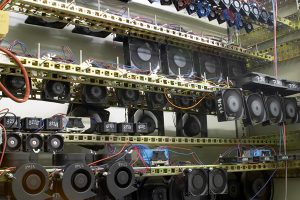Data center cooling plays a crucial role in ensuring the longevity and efficiency of the hardware infrastructure that supports IT operations. As data centers house a vast amount of high-performance servers, storage devices, networking equipment, and other sensitive hardware, managing the heat generated by these devices is essential to avoid catastrophic failures and data loss. The process of cooling in data centers directly affects both the performance and reliability of these systems. Computing equipment operates by processing electrical signals, which inevitably generate heat as a byproduct. When the temperature within a data center exceeds optimal thresholds, it can lead to a range of issues, including hardware malfunctions, reduced performance, and even irreversible damage. High temperatures cause components like processors, hard drives, and memory modules to overheat, leading to thermal stress. This thermal stress can cause parts to warp, fail prematurely, or lose the ability to function properly, which in turn can lead to downtime, data corruption, and loss.

In extreme cases, excessive heat can trigger thermal runaway, where the failure of one component causes a chain reaction, potentially affecting multiple systems. The acdc fan cooling systems in data centers are designed to regulate temperature by maintaining a consistent, controlled environment. Effective cooling technologies, such as air conditioning units, liquid cooling, and advanced ventilation systems, ensure that the temperature remains within a safe operating range. Cooling also helps maintain appropriate humidity levels, as excessive moisture or dryness can further damage electronic components. Airflow management techniques, such as hot aisle and cold aisle configurations, allow for better circulation and separation of hot and cold air, reducing the risk of heat pockets where temperatures can spike. With advanced cooling mechanisms, data centers can maintain temperatures that keep hardware running efficiently, reducing the likelihood of hardware failure. For example, consistent cooling can prevent issues like hard drive crashes due to thermal expansion and contraction, which is especially critical for enterprise storage systems where data integrity is paramount.
Furthermore, servers that run within optimal temperatures have higher processing speeds, as excessive heat can cause processors to throttle their speed to prevent overheating, which affects overall performance. Beyond preventing hardware failures, data center cooling also mitigates the risk of data loss. When hardware overheats, not only is there a risk of equipment failure, but data can become corrupted due to improper read/write operations. The data center cooling solutions reduce this risk by ensuring that components remain at operational temperatures, allowing data to be reliably accessed and stored. In environments where businesses rely heavily on real-time data processing, the uninterrupted performance of servers is essential to maintaining data integrity and preventing data corruption or loss during operations. Data center cooling is a critical factor in preventing heat-related hardware failures and minimizing the risk of data loss. By maintaining ideal operating conditions for servers and other hardware, cooling systems protect both the equipment and the valuable data they store, ensuring the reliability and security of IT operations. This not only supports business functions but also helps to safeguard against expensive downtime, repairs, and the long-term consequences of hardware failure.
